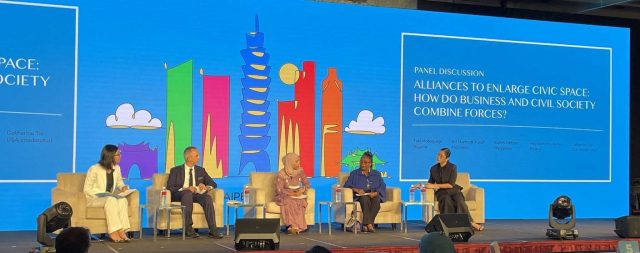Would democracy be stronger if civil society and business worked together? Many people don’t see how they would collaborate or where they would begin. Therefore, CIPE organized a discussion to explore multi-stakeholder collaboration at the Taipei Assembly of the World Movement for Democracy. The premise of the discussion was that collective action is needed across sectors of society to preserve civic rights and counter authoritarians who divide and rule.
Two business leaders and two think tank executives came together at the assembly to share their partnership experiences with a large gathering of activists. On the business side, Catch Ofilada, Deputy Director for Programs at the Makati Business Club, described how business in the Philippines has pushed for freedom of information legislation. In this joint advocacy endeavor, she said, “We always check with civil society first, so we speak with one voice.” From Nigeria, past President of the Lagos Chamber of Commerce and Industry Toki Mabogunje spoke about efforts to develop underserved youth as community leaders and entrepreneurs, through nonprofits like Lagos Island Connect. “We co-create with government, the private sector, and youth.”
On the think tank side, Sri Murniati Yusuf, Deputy Research Director at the Institute for Democracy and Economic Affairs, pointed to opportunities in Malaysia for collective action on anti-corruption. She found that, “We had been advocating for transparency without knowing there might be implications for the private sector.” Meanwhile in Poland, 53% of businesses got involved in helping Ukrainian refugees. Wojciech Przybylski, Editor-in-Chief of Visegrad Insight, saw complementarities between CSOs’ ability to start initiatives and the private sector’s ability to scale them, for instance through digitalization.
There is no one approach to collaboration, and so there is ample opportunity to learn across different situations. In Nigeria, an initially fragile relationship between civil society and business was transformed by a combined response to COVID-19 on health and education initiatives. In Malaysia, IDEAS creates a platform for groups with different perspectives to sit together. In Central Europe, regional collaboration and digital service mapping create opportunities to scale services and also the incentive of a potential market. Finally, the Philippines example involves three levels of collaboration: joint advocacy, knowledge sharing, and resource supports.
Here are memorable quotes from the session:
“Business does not exist in a vacuum. It’s part of society.” – Catch Ofilada
“We’re not telling anyone what to do but are here to facilitate.” – Sri Murniati Yusuf
“Business doesn’t want to die for anything.” – Toki Mabogunje
“Business is becoming aware that cooperation is something to be earned and fought for.” – Wojciech Przybylski
To sum up, alliances between business and civil society can start with a narrowly focused engagement while building a longer-term relationship, deepening mutual understanding, and respecting civic and human rights. There are indeed many ways to cooperate and a lot of common ground to be found. Special thanks to Ryota Jonen, Director of the World Movement for Democracy, for offering the main stage, to Andrew Wilson, Executive Director of CIPE, for framing remarks, and to Catherine Tai, CIPE Deputy Regional Director, Asia, for moderating the discussion.
Published Date: November 15, 2022
